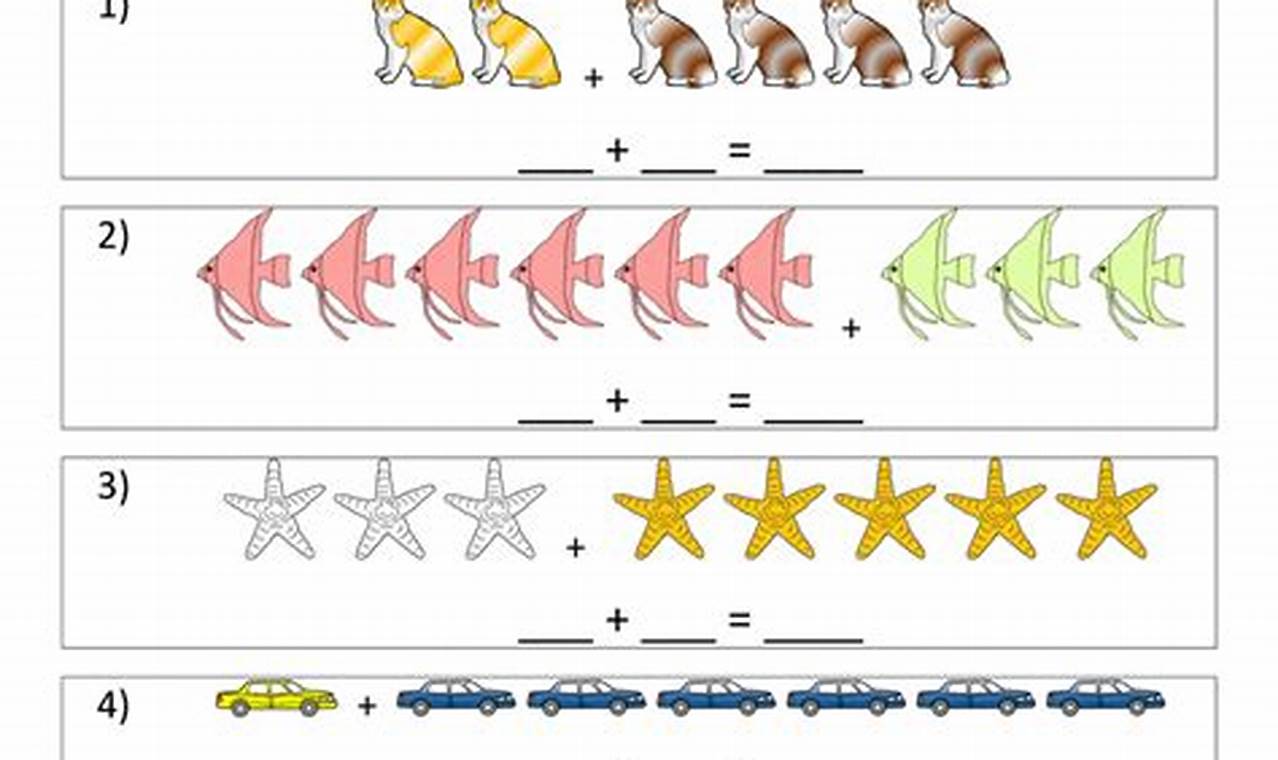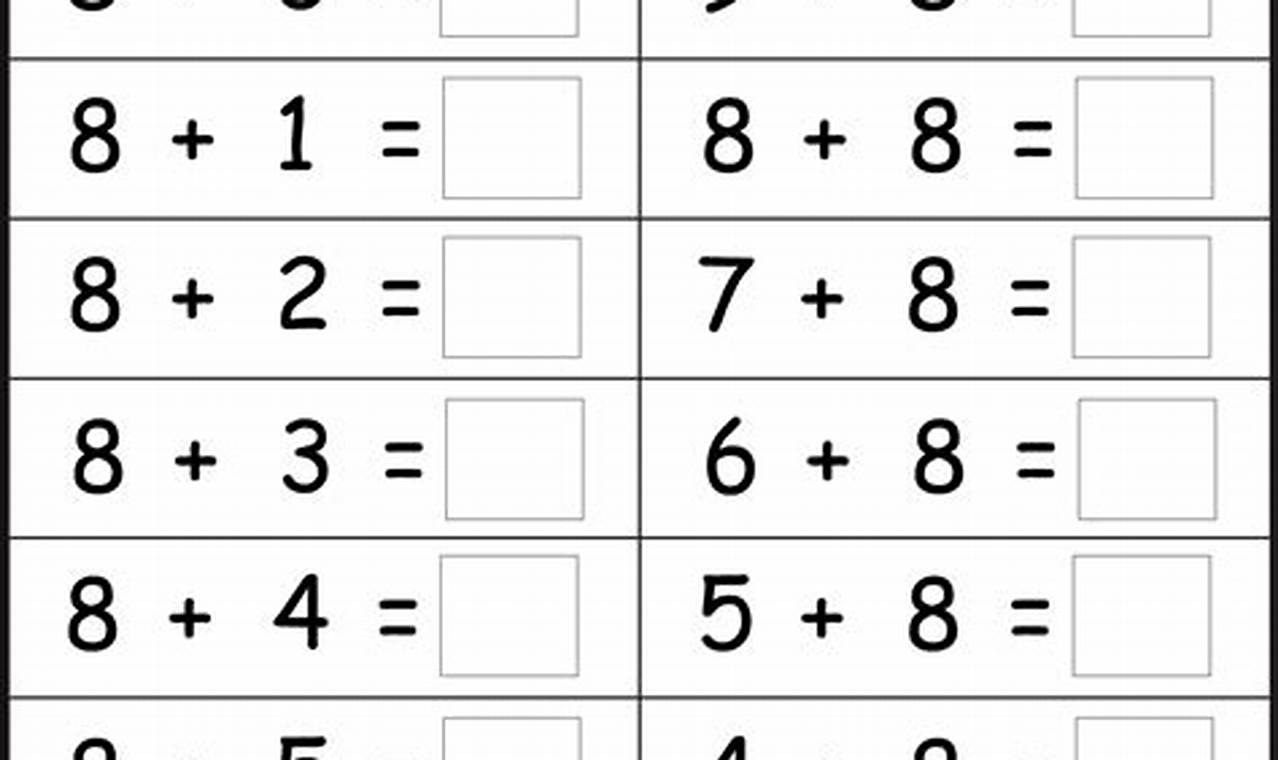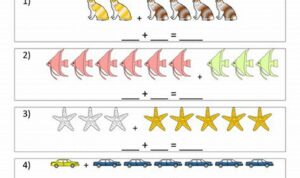An addition worksheet is a learning tool used to practice addition, a fundamental mathematical operation that involves combining two or more numbers to find their sum. It typically consists of a series of addition problems, ranging from simple single-digit sums to more complex multi-digit calculations.
Addition worksheets play a crucial role in developing children’s mathematical skills. They help students improve their number sense, develop mental computation strategies, and build a solid foundation for more advanced mathematical concepts. Worksheets provide a structured and repetitive practice environment, allowing learners to reinforce their understanding of addition and gain fluency in solving problems.
In the context of education, addition worksheets are commonly used as part of lesson plans, homework assignments, and standardized testing. They serve as a valuable resource for teachers to assess students’ progress, identify areas needing improvement, and provide targeted support.
addition worksheet
Addition worksheets are a cornerstone of early mathematics education, providing a structured and repetitive practice environment for learners to develop essential addition skills. Key aspects of addition worksheets include:
- Skill Development: Worksheets provide targeted practice, helping students improve their number sense, mental computation strategies, and overall addition fluency.
- Assessment Tool: Teachers utilize worksheets to assess students’ progress, identify areas needing improvement, and provide individualized support.
- Educational Resource: Worksheets serve as a valuable resource for teachers to supplement lesson plans, assign homework, and prepare students for standardized testing.
In summary, addition worksheets play a multifaceted role in the educational journey. They not only enhance students’ mathematical abilities but also support teachers in effectively monitoring and guiding their students’ progress towards addition mastery.
Skill Development
The connection between skill development and addition worksheets is fundamental. Worksheets provide a structured and repetitive practice environment, allowing students to reinforce their understanding of addition and gain fluency in solving problems. Through targeted practice, worksheets help students develop essential mathematical skills, including:
- Number sense: Worksheets help students develop a deep understanding of numbers, their relationships, and their magnitudes. By repeatedly working with numbers in different contexts, students develop a strong number sense, which is crucial for success in mathematics.
- Mental computation strategies: Worksheets provide opportunities for students to practice and develop mental computation strategies, such as counting on, making tens, and using number bonds. These strategies allow students to solve addition problems quickly and efficiently without relying on external aids like calculators.
- Overall addition fluency: Worksheets provide ample practice for students to develop overall addition fluency. Fluency is essential for success in mathematics and helps students solve addition problems accurately and efficiently. By practicing addition repeatedly, students develop automaticity and can focus their cognitive resources on more complex mathematical concepts.
In summary, addition worksheets play a crucial role in skill development by providing targeted practice that helps students improve their number sense, mental computation strategies, and overall addition fluency. These skills are essential for success in mathematics and provide a solid foundation for more advanced mathematical learning.
Addition Worksheet FAQs
This section addresses frequently asked questions about addition worksheets, providing concise and informative answers to common concerns and misconceptions.
Question 1: What is the purpose of an addition worksheet?
Addition worksheets are designed to provide targeted practice for students to develop their addition skills. They help reinforce understanding of addition concepts, improve mental computation strategies, and enhance overall addition fluency.
Question 2: Are addition worksheets only for struggling students?
No, addition worksheets are beneficial for students of all ability levels. They provide opportunities for practice, skill development, and assessment.
Question 3: How often should students use addition worksheets?
The frequency of worksheet use can vary depending on individual student needs. Regular practice is recommended to reinforce skills and promote fluency.
Question 4: What types of addition problems are typically included in worksheets?
Worksheets may include a range of addition problems, from simple single-digit sums to more complex multi-digit calculations.
Question 5: How can parents support their children’s use of addition worksheets?
Parents can support their children by providing a positive learning environment, encouraging regular practice, and offering assistance when needed.
Question 6: Are there any alternatives to traditional addition worksheets?
Yes, there are various alternatives such as interactive online games, math apps, and hands-on activities that can provide engaging and effective practice.
In summary, addition worksheets are a valuable tool for developing essential addition skills. Regular practice with worksheets can help students improve their number sense, mental computation strategies, and overall addition fluency.
Transition to the next article section: For further exploration of addition worksheets, including tips, resources, and activities, please continue reading.
Tips for Using Addition Worksheets Effectively
Incorporating addition worksheets into your teaching or learning routine can be highly beneficial. To make the most of this valuable tool, consider the following tips:
Tip 1: Gradual Progression
Start with basic addition problems and gradually increase the difficulty level as students demonstrate proficiency.Tip 2: Targeted Practice
Identify areas where students need additional practice and select worksheets that focus on those specific skills.Tip 3: Regular Use
Incorporate addition worksheets into regular practice routines to reinforce concepts and improve fluency.Tip 4: Variety and Engagement
Use a variety of worksheet formats and activities to maintain student engagement and cater to different learning styles.Tip 5: Immediate Feedback
Provide immediate feedback on student work to help them identify errors and reinforce correct methods.Tip 6: Positive Reinforcement
Encourage and praise students for their effort and progress, regardless of their initial skill level.Tip 7: Visual Aids
Incorporate visual aids such as number lines or manipulatives to support understanding and make learning more interactive.Tip 8: Technology Integration
Explore interactive online worksheets or math apps to supplement traditional worksheets and provide additional practice opportunities.
By following these tips, you can maximize the effectiveness of addition worksheets in your teaching or learning journey.
Transition to the article’s conclusion: For further exploration of addition worksheets, including resources and activities, please continue reading.
Conclusion
Addition worksheets play a significant role in developing strong mathematical skills in individuals of all ages. They provide structured practice opportunities to enhance number sense, mental computation strategies, and overall addition fluency. By incorporating addition worksheets into regular learning routines, educators and learners can effectively reinforce concepts, assess progress, and promote mathematical proficiency.
The effective use of addition worksheets requires a thoughtful approach, considering factors such as gradual progression, targeted practice, regular use, and positive reinforcement. By embracing these strategies, educators and learners can unlock the full potential of addition worksheets as valuable tools for mathematical growth and success.


